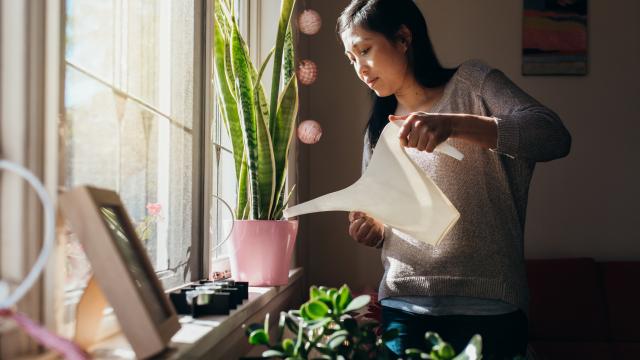They’re not the first generation to keep house plants, but millennials seem to have earned a reputation for gratuitous indoor foliage. Bloomberg reporter Matthew Boyle claimed that young people have helped revive “the once moribund market for house plants” in the US, where, according to the National Gardening Association, sales surged 50% between 2016 and 2019. In the UK, the Royal Agricultural Society reported a 65% increase in house plant sales in 2018 alone.
Why young people in particular might be so fond of house plants has invited numerous explanations. Lifestyle reporter Casey Bond argued that house plants offer something to nurture that’s cheap and doesn’t involve a lot of maintenance, with obvious appeal to a generation whose entry into parenthood is stymied by house prices and economic instability. Young people today are thought to be more conscious of mental health and self-care too, and plants have been proven to reduce stress levels and improve mood.
But the universal appeal of house plants, according to writer Alice Vincent, is that they provide “a tangible way of connecting with nature that is absent from an increasingly screen-based world”. That could explain why their sales ballooned again during lockdown, and not just among younger customers.
Anthropologist Gideon Lasco described the phenomenon in his native Philippines as a “botanical boom” that seized Manila. Plants, far more mobile than locked down humans, were ordered online in record numbers and ferried to anxious households where they acquired names and were photographed alongside their new family. Patch, a British online plant store established in 2015, reported a sales increase of 500% during lockdown, with stock intended to last 12 weeks vanishing in two.
Since June 2020, I’ve been talking to people around the world to better understand the role plants play in these times of forced isolation. My project, Care for Plants, started by collecting photographs and videos of people caring for their plants and asking them to explain what they meant to them. By interviewing some of these people, I learned how plants provide care for their human companions too.
A potted history
Plants offered not only bonding, but recreational and educational opportunities to their human families during lockdown. Brian started growing tomatoes with his children – part scientific experiment, part family pastime. Mai had to keep her toddler busy, and turned the chore of watering and re-potting her plants into a fun activity.
With her access to the outside world restricted, Aoife found solace in nature, and would gently submerge her hand in the soil to decompress and heal after a long day. Likewise, Aveline described her experience with plants as one that “empties the mind so that I can stop being anxious”. Merima talked about her lawn as a “void filler” for her family. “In the lawn we can still talk about the future. What should we plant and do next and it’s a very positive experience.”
The pandemic tore away our shared sense of normality. Amid the rupture, caring for plants invited welcome new routines – watering, feeding, trimming and re-potting. Plants provided an escape from the anxieties of everyday life, offering beauty and proof that life could still flourish in the darkest times. Xin, who showed me her indoor jungle over a video call, told me that “more plants make a place feel luxurious. A sort of lockdown luxury for those who can work from home and create a nest”.
But one of the most interesting aspects of my research was listening to stories about how people discovered a need to appreciate plants. Laura explained that she felt a new responsibility towards her plants because she more fully appreciated their companionship. Lucia, whose vibrant social life had made her largely unavailable to her plants, was finally able to keep them alive and wanted to learn how to make them feel appreciated, as a way of acknowledging how they enriched her life in lockdown.
New shoots
Conversations about care have multiplied during the pandemic. We clapped for carers and saw grassroots mutual aid networks emerge, providing care in our neighbourhoods and often filling in for inadequate public provision.
But speaking with plant owners in lockdown, I unearthed new networks of care and solidarity between humans and other species. The gratitude that people felt for their floral companions challenged the view that nature exists simply to be used by humans and made many see for the first time how non-human beings enrich our social world.
The stories I collected suggest we need a broader understanding of social relationships and solidarity; one that appreciates the importance of non-humans in everyday life. Many hope that the pandemic marks a turning point in the way humans interact with the rest of the natural world. Perhaps this watershed could be reached in our own homes, by recognising that the non-humans we share our lives with are equal partners in building a more sustainable and just future.
All names have been changed to protect the individuals’ identities.![]()
This article is republished from The Conversation under a Creative Commons license. Read the original article.

Leave a Reply
You must be logged in to post a comment.